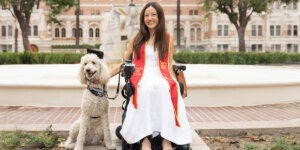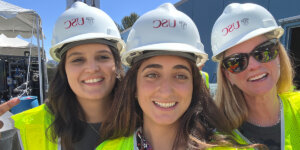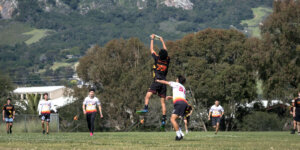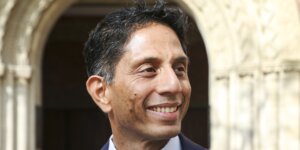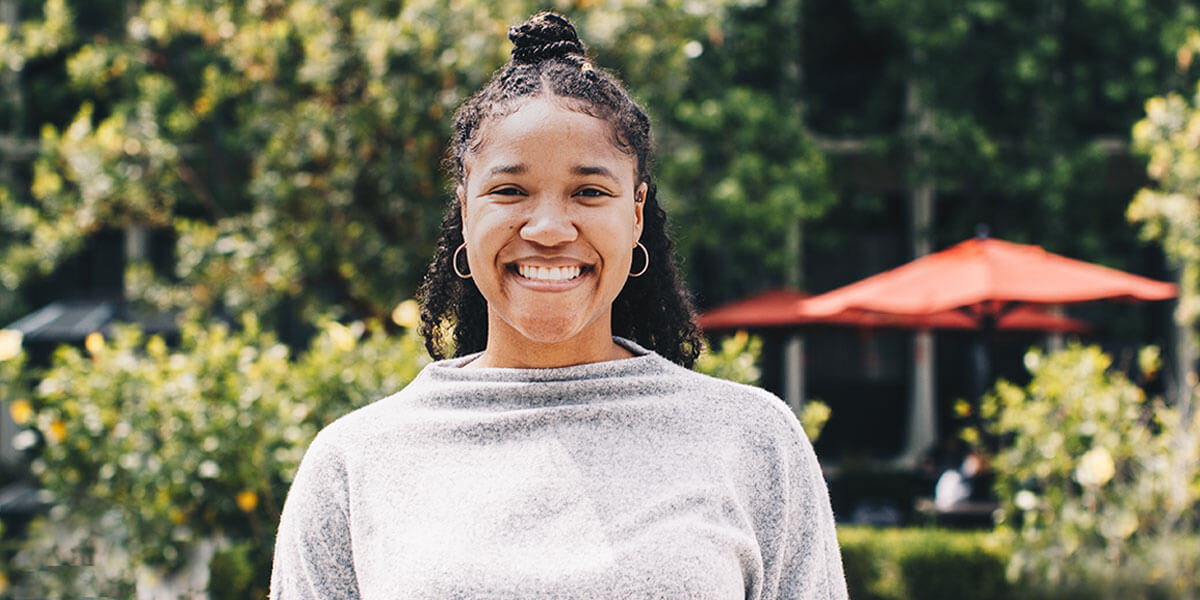
Avri Parker, who served as president of the award-winning USC chapter of the National Society Society of Black Engineers. Photo/Kayly Luong.
Growing up in a predominantly white neighborhood in Washington, D.C., Avri Parker was aware that she was one of only two black girls in her class interested in computer science.
She is also aware that the national average of black engineering students sits at around just five percent. Parker doesn’t need to see the statistics—all she needs to do is look around the room and count the students who look like her.
As president of the award-winning USC Viterbi chapter of the National Society of Black Engineers (NSBE), Parker has been working to change that.
One of the largest student-run organizations in the country, the NSBE’s mission is to increase the number of culturally responsible black engineers who excel academically, succeed professionally and positively impact the community
“I really take the NSBE mission to heart,” said Paker, who graduates May 10 with a B.Sc. in computer science and business administration. “It’s like a big family – there is no other space on campus where you can see so many black engineers.”
“It’s like a big family – there is no other space on campus where you can see so many black engineers.” Avri Parker on the National Society of Black Engineers.
Parker has already secured a job at Microsoft in Redmond, WA, as a project manager, and will start 10 weeks after graduation. Her ultimate goal: to become a chief technology officer at a tech company and invest in improving the pipeline for young black women in science, technology, engineering and math (STEM).
Fortunate Accident
At 21, Parker is the oldest of eight children—her youngest sibling is just seven years old.
“I love being the oldest sibling—I get to do everything first,” she said. “I get to fail first, which is not so cool, but that’s how you learn.”
She recalls being interested in technology from a young age, beginning with a fortunate accident when she was about 12 years old.
“I accidentally dropped my first iPod—devastating, of course—but when I picked it up, I could see the motherboard underneath the smashed screen. That’s what first really got me interested in technology. I looked it up how to fix it on YouTube,” she said.
“Then, when I was in middle school, my technology teacher told me there was a computer science class at the high school level, so from then, that’s what I was working towards.”
Rising to the Challenge
Parker admits math and computer science didn’t come easily to her. In high school, she was in the regular math track, but was determined to boost her grades enough to pursue her dream of studying computer science at university.
“I ended up taking a test to get into the advanced level course, but I knew for me it was always going to be difficult,” she said.
At first, it was. Despite her success at in the SATs and acceptance to USC, during her first year, she considered dropping computer science as a major altogether.
“I was overwhelmed,” said Parker. “It’s very hard to reach out to people and ask for help without first having a connection with them. I found it difficult, especially as an introvert.”
But then, she found the National Society of Black Engineers (NSBE) USC chapter, which won the organization’s coveted National Chapter of the Year award in 2018.
Representation Matters
Even for a student like Parker who grew up in a family focused on STEM—her stepfather is a computer consultant and her mom is a technical writer—having role models to look up to made all the difference.
“There were people in the year above me who had taken the same classes, who looked like me, who found the same struggles and NSBE was where they found their support group,” she said.
After a stint as senator, in 2018 Parker became the NSBE President of the USC Chapter. Last spring, the society partnered with Google to put on the second Black Excellence Gala, a night to celebrate black excellence in industry and at USC, which she describes as one of her proudest moments.
More than 100 people attended, including NSBE members, tech professionals, business owners and organization alumni for an evening of networking.
Since Parker joined in 2015, the society has almost double in size, from 40 to 70 members. Earlier this year, the USC Viterbi student chapter of the National Society of Black Engineers won first place, Academic Technical Bowl and first place, Debate. And Parker hopes this is just the beginning.
Into the Fold
By piquing students’ interest early on and providing all-round support during the transition from high school to college, the goal of the NSBE is to bring more minority engineers into the fold and keep them there. Parker believes this goal should start as young as possible.
“People who look like me – black people and women – often don’t realize STEM is an option for them.” Avri Parker.
That’s why, during her sophomore year, she taught at spring camps with USC Viterbi Associate Professor of Computer Science Practice Jeffrey Allen Miller, helping local kids, from kindergarten to third grade, learn basic computer science concepts. It’s also why she hopes establish a school catered towards black girls in the future.
“People who look like me – black people and women – often don’t realize STEM is an option for them,” she said.
Parker’s advice for anyone hoping to follow in her path? Chase your goals with passion; even when things are challenging, the rewards are great. Her stance can be summed up by her favorite quote, from the movie Drumline:
“Ain’t no class teach me how to do me.”
“Your classes and grades don’t determine you,” said Parker. “If you love what you do, you will succeed.”
Published on May 9th, 2019
Last updated on May 16th, 2024




